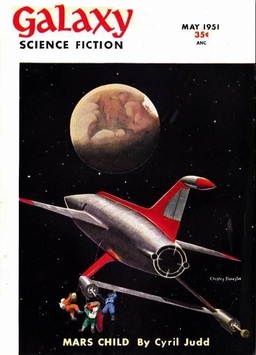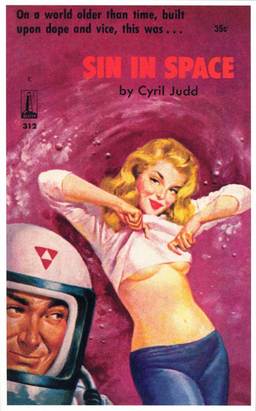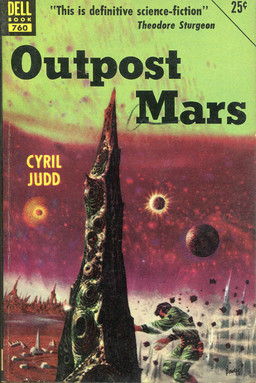Galaxy Science Fiction, May 1951: A Retro-Review
 The May, 1951 issue of Galaxy featured the first installment of a new novel, two novelets and two short stories.
The May, 1951 issue of Galaxy featured the first installment of a new novel, two novelets and two short stories.
By this point, I would think readers would be thrilled by this magazine. It’s amazing to consider how many of its stories were later reprinted, and how so many authors became legendary in the field (if they were not already so).
“Bridge Crossing” by Dave Dryfoos — Roddie grew up among androids and is the only human left within the city of San Francisco. There are other humans who live outside the city and raid it for supplies; Roddie views them as enemies. One night, he finds one and decides to act friendly to the woman to learn more about his enemies. Despite their commonality, he is determined to remain allied with his android friends.
Dave Dryfoos had over 20 published stories between 1950 and 1955. And that was it. He didn’t die until 2003, but I can’t find information on why he seemed to stop writing in 1955 (if that’s in fact what happened).
At any rate, “Bridge Crossing” is an interesting tale and I only had a feel for where it was going, not a definite sense (which kept it tense). And it had a great last line.
“Mars Child” (Part 1) by Cyril Judd — Mars is colonized by pioneering humans, some of whom feel like Mars is a second chance to populate a planet without all of the pollution on Earth. The Sun Lake colony depends on trade with Earth to thrive, but the colonists hope to one day sever ties with Earth — to be completely independent. Dr. Tony Hellman, one of the colony’s council members, delivers a newborn to eager parents, but his main duties include assessing the radioactive levels of their exports.
 The military that enforces the law for all colonies visits Sun Lake, explaining that someone has stolen large amounts of a Martian narcotic. The tracks lead toward Sun Lake and they are presumed guilty unless they can prove otherwise.
The military that enforces the law for all colonies visits Sun Lake, explaining that someone has stolen large amounts of a Martian narcotic. The tracks lead toward Sun Lake and they are presumed guilty unless they can prove otherwise.
If the colonists are unable to find the narcotics before the next ship arrives from Earth, the military would impose a six-month blockade on all imports and exports. The colonists aren’t certain if they’re being framed or if there is a thief among them. Either way, they have only a few days to find an answer.
Cyril Judd is actually a pseudonym of Cyril M. Kornbluth and Judith Merril. Together, they also wrote a serialized novel, titled Gunner Cade, for Astounding in 1952. “Mars Child” was published as a novel under the title Outpost Mars and later reprinted as Sin in Space.
I had to ignore some of the ideas — like breathable Martian air (with the help of a routine drug), but overall, it has decent plausibility. Besides, this is pulp fiction, so you have to allow for some leeway. I like the characters and the subplots seem to be working together well so far.
My only real complaint is that there were subtle clues about the narcotics theft, which I liked, but then a heavy-handed clue soon after. That dropped the intelligence level of the piece. I liked the sense that I was solving the mystery; I didn’t want it handed to me.
Granted, the mystery is still unfolding, so maybe it’s not what I think. I’ll try to reserve judgment for now.
“Hostess” by Isaac Asimov — Rose Smollett and her husband, Drake, offer their home to a visiting alien. Harg Tholan, from Hawkin’s Planet, has a bovine appearance, but he’s learned to speak English fairly well.
Dr. Tholan is investigating the cause of an unknown disease that’s killing its people. Rose, as a fellow in biology at a local institute, hopes to study their guest closely, since so little work has been done on Hawkinsites. Her husband, however, is a policeman; actually, even his wife doesn’t know his exact title — only that he wants to study their guest closely for his own purposes.
 I loved the interplay between Rose and Drake. Also, Harg Tholan seemed like a well-designed alien, both in looks and needs (like the occasional intake of cyanide). It did seem a bit long, though, and I didn’t quite connect with the ending as much as I hoped to.
I loved the interplay between Rose and Drake. Also, Harg Tholan seemed like a well-designed alien, both in looks and needs (like the occasional intake of cyanide). It did seem a bit long, though, and I didn’t quite connect with the ending as much as I hoped to.
“Men of Destiny” by John Christopher — When Theodore Pike’s ship becomes stranded near a distant solar system, he finds a hospitable planet and lands. The natives he encounters revere him as a god, so he decides to become a benevolent one. After all, he can never return home, so he plans on making a sizeable mark where he is.
This was my favorite story of the issue. I loved Pike’s character and the way this one played out. It was definitely the feel-good story of the issue.
“Ask Me Anything” by Damon Knight — Krisch is a director on a hidden world, helping to create the perfect army — an army of men so fused with metal and technology that all of their weaknesses are removed.
But something has begun planting ideas in the younger soldiers — ideas that could lead to emotional instability. When he discovers the source, he conceives of an even greater weapon — one that could grant him immense prestige.
There were parts of this that I found chilling — for example, how humanity no longer mattered, so long as the perfect army could be created. And I was very surprised by the source of the problem. The story had a great pace to it and a slight zinger at the end.
Matthew Wuertz’s last retro review for us was the April issue of Galaxy Science Fiction.
I was ready for you this time, Matthew!
The editorials are always interesting. Apparently the authors insisted on having their stories ranked by the readers. That is a little hard for me to believe, but Mr. Gold presents us with a list from each issue of how the stories stacked up. Asimov and Matheson, for example, finished 5th and 6th with their stories in Galaxy’s first issue. This is a cruel but effective way to find out what readers were looking for.
“Bridge Crossing” was a fun journey. I see this as a fifties dystopia, when we (well, not me, I wasn’t around yet) were all worried about robots taking over the world. The humans find their way to freedom (sort of), and Roddie discovers a new part of the human experience in Matthew’s aforementioned last line. Ida does show some thought and leadership, but remains, primarily, a typical submissive female character of this era.
I loved “Mars Child.” There is nothing terribly new or profound, but it is fun to see how the characters and subplots develop. The story of the Tollers and their son was written with great maturity and particularly touching. Yes, the science is iffy at best, but I think the authors did a nice job of setting up a community and a crisis that the reader cares about. I am also eager for the next installment.
Willey Ley’s article on Aadvarks was fun. When I am plowing through my back issues of F&SF, Isaac Asmiov’s science articles are always a highlight. We nerdy sci-fi fans love to believe that these stories and settings that we read about have some basis in the real world, so why not venture into that world a bit in each issue?
I agree that “Hostess” was too long for its premise and development. I sometimes wonder is Isaac Asimov tried to be a little too clever with some of his stories. The progression and conclusion seemed to be something more suited for Ellery Queen’s Mystery Magazine, where we have to wait for the last few lines to see what was really going on. The ending was a surprise, but not a particularly satisfying one.
“Men of Destiny” is kind of a Dances With Wolves in space, where Theo is respected (revered) for his unexpected arrival and superior technical knowledge. I loved the relationship he built with the natives, and was touched by Pernar when he rescued him from the flood. It is always nice to read a story that encourages respect for aboriginal culture, even with his ill-fated attempt to help them out with a steam engine.
“Ask Me Anything” made me think of “Ender’s Game.” both of which are harsh commentaries on military training and war. “Ask” is not far removed from WWII, and draws on fears from not only war, but robotic intrusions into humanity. “Ender” grew out of our experience in Vietnam, and focused more on direct hatred of the military mind as a whole, which would have resonated well at that time. The ending of “Ask” is chilling, with the suggestion that the individual quest for power, no matter the cost, is inevitable.
Thanks, Matthew. See you next month.
Gus,
I can tell you were well prepared. 🙂
Great comments and analysis! I hadn’t thought of the parallel between “Ask Me Anything” and “Ender’s Game” (one of my favorite books of all time). That’s an interesting take on it.
I look forward to future comments from you on these issues. And if you want to fill in comments on any of the previous issues, feel free. 🙂
-Matt
At some point I may try to catch up from the beginning. I am missing issues 4 and 5, so I need to find them first. From where we are now, however, I am good for several years. I hope others decide to join us, too.
Your picture of “Sin in Space” got me into a bit of trouble when my wife saw me typing and then saw it on the screen! She’s a good sport, though, so all is well.
[…] Child” Part 2 by Cyril Judd (Part 1 appeared in the May issue) – Tony, the colony’s doctor, heads to Marsport to welcome the latest arrivals. […]